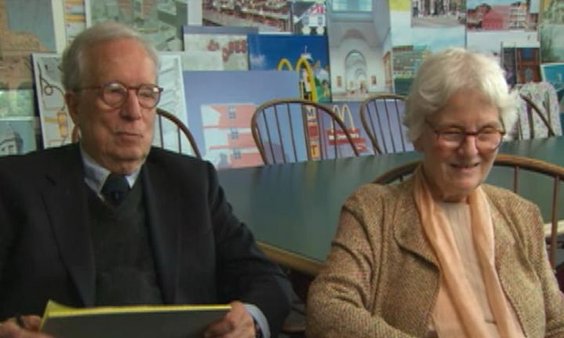NEXT STORY

The importance of good clients; Vanna Venturi House
RELATED STORIES

NEXT STORY

The importance of good clients; Vanna Venturi House
RELATED STORIES


|
Views | Duration | |
|---|---|---|---|
| 1. Architecture as flexibility; form follows functions | 3 | 1552 | 07:34 |
| 2. How urbanism has made us better designers | 1 | 310 | 05:11 |
| 3. Redefining function | 301 | 03:14 | |
| 4. Mannerism (Part 1) | 340 | 04:11 | |
| 5. Mannerism (Part 2) | 241 | 05:20 | |
| 6. Symbolism and signs | 452 | 04:10 | |
| 7. Learning the difference between 'is' and 'ought' | 170 | 06:45 | |
| 8. Protests over our use of neon | 159 | 01:11 | |
| 9. The New Objectivity | 192 | 03:34 | |
| 10. The importance of good clients; Vanna Venturi House | 221 | 03:08 |

[DSB] Social sciences said you have to… you have to know more, basically, to do architecture today, particularly urban architecture. And in tough fields for architects, because sociologists and architects don’t mix, it’s quite difficult on both sides. So, the notion of looking at what is – with open eyes – has, I think, been a very creative one in early Modern architecture. It was called the New Objectivity, and early Modern architects said get away from the 19th century architecture of decoration and styles, and look at what’s happening across the tracks at the railroad stations – not the railroad stations – the factories. Railroad stations were very decorated, although they were a marvellous new building type. But learn from factory architecture, and it’s a question of stripping away, by being objective and looking at what really exists, at what’s real and what’s real for the future. So that was called the Neue Sachlichkeit, and it was a creative philosophy that kind of went wrong. It led in the end to some rather stultifying, rather dull architecture, at least, Le Corbusier thought so, and it’s had a bad name ever since.
In the 1950s in England, the Brutalists revived it, and I got from them another notion, which says, if you look straight at things, you try to be newly objective. And they called it the New Objectivity because why would Neue Sachlichkeit be pronounceable even, in England? So at… their new objectivity I suddenly realised was the Neue Sachlichkeit, but made more creative. And they basically said, if you solve problems very directly according to their real functional needs – now there’s a big debate: who defines function? Every sociologist I know of would have said, you’re defining function architect, are you defining it right, should it be a political method of – should there be a political method of defining function, finding out what people want? But, if you take it that you follow function, well-defined function and you reach a design conclusion that you find incredibly ugly – how could I have designed something so awful? Live with it a while, and you never know, if it’s the right solution, you may, in fact, find it’s beautiful. And Lou Khan said something similar, he said, ‘You hate it, and you hate it, and you hate it, until you love it because it’s the way it has to be’. Well, if you can live with those ugly messes that you’re producing to solve important problems, maybe you can find a new aesthetic in line with another age, in line with a new social reality. So I have looked at functionalism that way, that I want to be functional for moral reasons, but I also want to be functional for aesthetic reasons, because I think going beyond the ugliness of a good solution, might help you to be a better artist.
Internationally renowned architects Robert Venturi (1925-2018) and Denise Scott Brown (b.1931) have helped transform contemporary design through their innovative architecture and planning. Winners of numerous prestigious awards, their designs have championed multiculturalism, social activism, symbolism, pop culture, history and evolving technologies.
Title: The New Objectivity
Listeners: Thomas Hughes
Thomas Hughes is Mellon Professor Emeritus of the History of Science at the University of Pennsylvania and Distinguished Visiting Professor at the Massachusetts Institute of Technology. His most recent books include Human Built World, Rescuing Prometheus and American Genesis. He is a member of the American Philosophical Society, US National Academy of Engineering, Royal Swedish Academy of Engineering Sciences and the American Academy of Arts and Sciences.
Duration: 3 minutes, 34 seconds
Date story recorded: 22nd to 23rd September 2006
Date story went live: 27 May 2010